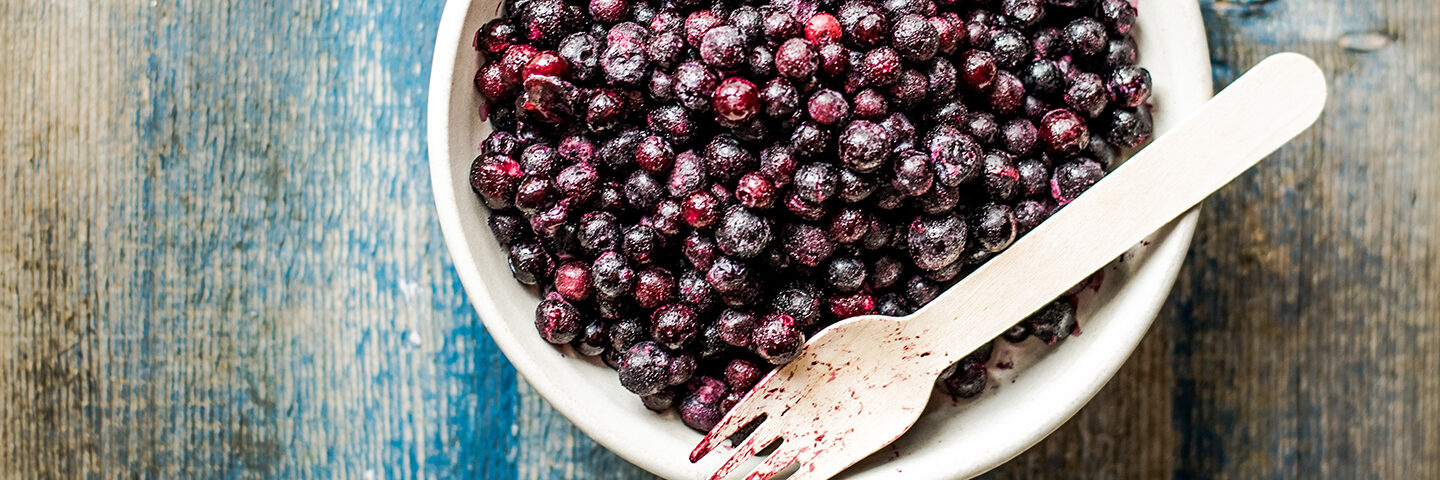
Are frozen fruits and vegetables better than fresh or vice versa?
Answer
The answer to this question is not straightforward as we can’t say any fruits or vegetables are more nutritious frozen or fresh. The reason for this is that it depends on the nutrients being measured and how the product is prepared. What we know is that both frozen and fresh fruits and vegetables are healthy choices. The best thing to do is eat a variety of fresh, frozen, canned, dried, and 100% juice to achieve ideal nutrition.
Americans are failing to eat the recommended daily amount of fruits and vegetables.1 An easy solution – increase availability at home by keeping frozen produce on hand at home. But, are frozen fruits and veggies as healthy as fresh or are too many nutrients lost when they are processed? Turns out that frozen fruits and vegetables compare nutritionally to fresh, making them a healthy option to help increase consumption.2,3,4
A 2007 study compared nutrient levels of vitamins C, A, E, B vitamins, fiber, phenolic compounds (antioxidants), and minerals to determine differences between fresh and frozen fruit and vegetables.3,4 The study found that overall frozen fruits and vegetables were nutritionally comparable to fresh varieties. Only slight losses of vitamin A was noted in frozen produce when it was heat processed, but it really depended on the freezing method used and the fruit or vegetable being processed. Interestingly, vitamin E was less affected by heat processing. Levels of vitamin E were found to be higher in cooked produce that had been previously frozen than fresh cooked produce.
Another study looked at the retention of nutrients in eight frozen fruits and vegetables compared to produce kept in a refrigerator.5,6 The researchers found frozen produce to also be nutritionally comparable to fresh fruits and veggies. However, beta-carotene (converted into vitamin A in the body) in frozen spinach, carrots, and peas was found to be lower than their counterparts that had been stored in a refrigerator. Overall, the differences between frozen and refrigerated produce was not significant for phenolic compounds, fiber, minerals, and vitamins making frozen produce a healthy and convenient option.
Frozen fruits and vegetables are a healthy alternative for increasing fruit and vegetable consumption. They are fast to prepare, economical, and delicious making them a perfect addition to any meal. By adding frozen produce to meals, you have greater cooking options and always have fruits and vegetables on hand. When time is really short or cooking is not your thing, frozen entrées can be packed with fruits and vegetables and are another great option for increasing daily fruit and veggie intake. For more details, check out this study from the Frozen Food Foundation.
All forms of fruits and vegetables matter! Frozen fruits and veggies are equally nutritious compared to fresh and should be part of your day. So, check out the recipes below and eat up!
-
202o PBH State of the Plate: America’s Fruit & Vegetable Consumption Trends. View
-
Frozen Food Foundation. Research. Last updated 2015. Accessed September 5, 2015. View
-
Joy Rickman, et al. Review: nutritional comparison of fresh, frozen and canned fruit and vegetables. Part I. Vitamins C and B and phenolic compounds. J Sci Food Agric. 2007; 87:97-944. Doi: 10.1002/jsfa.2825.
-
Joy Rickman, et al. Review: nutritional comparison of fresh, frozen and canned fruit and vegetables. Part II. Vitamin A and carotenoids, vitamin E, minerals and fiber. J Sci Food Agric. 2007;87:1185-1196. Doi: 10.1002/jsfa.2824.
-
Ali Bouzari, et al. Mineral, Fiber, and Phenolic Retention in Eight Fruits and Vegetables: A Comparison of Refrigerated and Frozen Storage. J Agric. Food Chem. 2015;63:951-956. Doi: 10.1021/jf504890k. Vie
-
6 Ali Bouzari, et al. Vitamin Retention in Eight Fruits and Vegetables: A Comparison of Refrigerated and Frozen Storage. J Agric. Food Chem. 2015;63:957-962. Doi: 10.1021/jf5058793.


